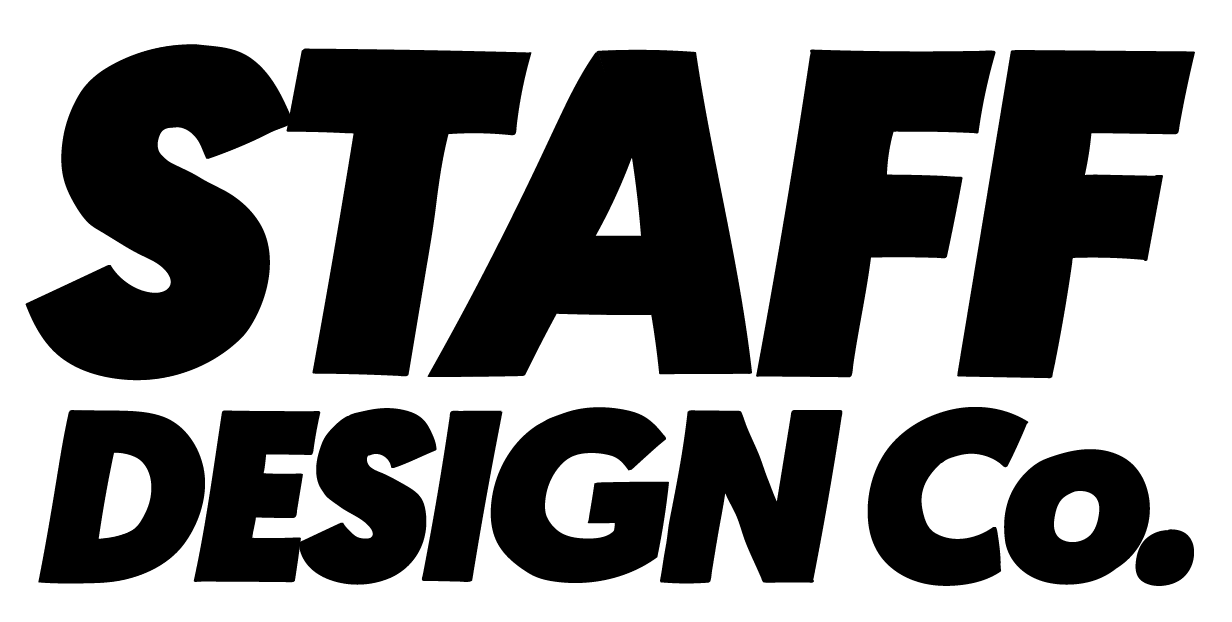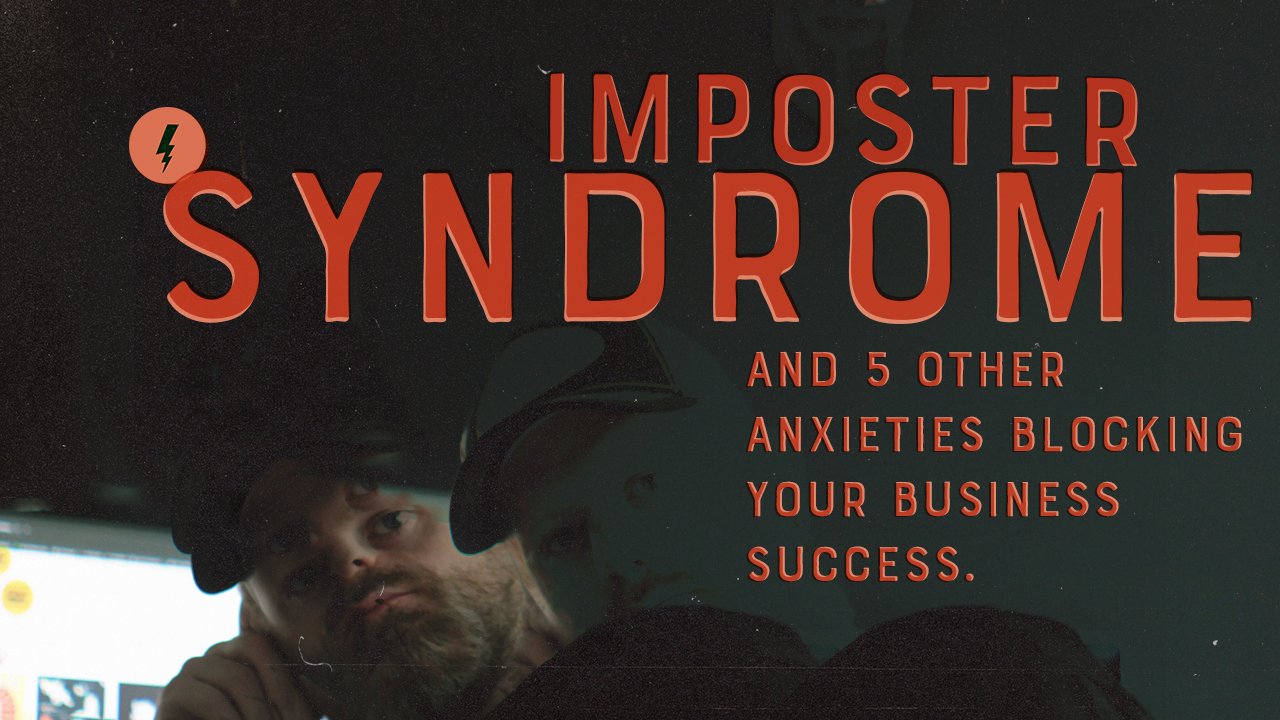Imposter syndrome and 5 other anxieties blocking your business success.
I suffer terrible imposter syndrome alongside a range of anxiety issues that can severely effect my performance and success.
I know first hand that I am not the only one. For years now through various studios and companies I have witnessed, worked with and managed people with variations of the same issues as well as a whole suite of other symptoms causing them to be held back from producing to their maximum.
I believe that’s why I’m here building a platform to share experience good and bad and offer opportunities, encouragement and ideas to get though.
Why is imposter syndrome a block?
It is the key anxiety I think most creatives suffer - I’m not good enough or at least not as good as this other person, I don’t have enough experience - I’m have too much experience to learn something new or fit in there (I get that one all the time).
It’s a lie that stifles our ability to tap into the, particularly mental, freedom that unleashes our full creativity, ‘cus we’re fully wrapped up in what is essentially panic that we’re not going to be good enough so we lock ourselves down to what is comfortable.
I’m here to say you don’t have to worry about imposter syndrome. Everyone and I mean literally everyone gets some degree of it - some just learn to get past or cope with it better or quicker than others.
Like the entirety of instagram posts tells you you have to stop comparing yourself to others - that has nothing to do with seeking learning and inspiration from others just that you have to stop feeling the damage from not being so and so. If you feel that your are feeling lost in someone else’s shadow, learn about them. Look for that person’s struggles and experience to understand how they got to where they are; the hours of practice they’ve put in - but remember some are naturally incredibly talented too - also remember that that person is performing brilliantly in the niche or specialism they have realised so maybe it’s simply that you haven’t found yours yet, this goes back to putting in the hours, work at it, try different things, look for what both gives you the most pleasure and comes the most natural - it’s a good bet that this intersection is where you’ll start see, and more importantly feel, some success.
What about confidence - how does that affect and manifest?
I mean, if you’ve got this far you’ve read a chunk about one type of confidence issue but it manifests in other areas and in fact I have an idea that it is pretty much the root of most of the other key issues I’m gonna talk about.
Let’s take finding your voice for example. This can mean both your style but also how you interact in the space you’re in.
If your a soul worker (freelancer, soul designer in a marketing team, etc), there are different communication challenges affecting your voice than if you’re part of an in-house team or an agency studio.
If you work alone you are trying to express your voice - your design or writing style or marketing philosophy whilst working on the briefs of others to express their aims. However, as part of a team there is a tone or style that that agency or department is trying to get across a more holistic view - this agency’s style is…, etc.
In an in-house team it’s different again as you are going to have to work harder to express your and the teams’ view as you have to ‘sell’ it to colleagues too and deal with hat I call the ‘diminishing sound of an internal voice’ issue. The DSIV is where you can be saying things endlessly - expressing fact or opinion, ideas or challenges and nobody seems to listen but as soon as a consultant or other outside source comes in, they say the same thing and everyone is like: “oh right, Wow, why did we never think of that or see it that way?” - you know exactly what I mean right?!
So all of the above is about learning to speak the internal language of your organisation and spend valuable time alongside key players and decision makers learning how they think and communicate so you can better make your points to them on a level they are clearer with - trying to swim against the waves will just make you tired.
So learn what they are thinking when they are briefing you - listen for what they are trying to say and this can be like trying to pick out an individual part of a song - you know it’s there but it might not be clear at first - so ask questions, repeat what you think you’ve heard (this is know as ‘active listening’ and is your one major go to tool when taking a brief), draw pictures and notes and ask if you’re on the right track then don’t just disappear until you produce the final thing - try and be communicative during the process, checking in giving feedback and may sharing iterations - this makes the person setting the brief feel involved and part of the process, helps them understand thinking and gives you more quality time with them helping them understand you and vice versa.
I have no doubt that you will find you have more success working this way and although, granted it sounds like more work but it is very much quality effort you are investing, and I know for sure that you will find you have more confidence after putting in this work - because you have built a relationship that you understand better, reduced the intimidation factors and opened a good dialogue - essentially you are reforming your comfort zones to be more in line with your ideas of what success is. Learning!
Creative block is a genuine challenge, and I have written a specific blog on that here (link), but the brief breakdown is that that is a kind of confidence issue too - maybe you haven’t got a tight enough handle on the brief or there are not enough parameters or you don’t feel comfortable in the environment or field your working in yet.
Practically you can reset you mind by taking breaks, work on something else or get other input from somewhere however, philosophically, you need to get a hold of your mindset and reassert your understanding of what you’re trying to do. Go back to the brief re-read it and pull out keywords then do some thinking on those words - what do they mean, emote or conjure?
Is there a different approach if you ‘squint’? What? So when you’ve drawn a bunch of shapes and squint you might see something else, but maybe you can do that mentally if you right the keywords differently - maybe synonyms or even as simple as using a different colour sticky note or put them on the wall and live them around - a method I employ all the time - it looks amazing and that can be enough sometimes!
The worst you can do is put it down and walk away - even with a tight deadline - you are much better taking 5/10mins out than bashing your head against it for an hour!
Communicate better with others and share your ideas
Whether you are looking to share your ideas with clients or in-house teams or colleagues, the first thing to remember is that you are being hired or consulted for a reason - however long in the tooth or green you are, you have unique and key qualifications for the task so don’t be afraid to speak up and share your thinking.
Let’s start with simply sharing ideas; you may feel more comfortable if you practice and/or back up you’re thinking with research or facts, if you can gain experience working with others who have more and watch how they handle themselves in client meetings that’s a great way to learn and I’ve already talked about building relationships and trust which you need to do with your clients - ideally you can spend a little time with them in a couple of calls or meetings to learn a little - and use this time wisely - learn about who they are, what matters to them and how they communicate - its takes a lot of listening and reading between the lines but it can open all the locks as to how to word your arguments and tone your delivery.
Now I do want to address the challenges of being new to a team and being part of a toxic environment as these can be incredibly destructive to your entire life, never mind confidence and career.
I have endured and witnessed environments where individuals can be disrespected, their opinions and ideas disregarded and the work belittled.
How does one gain confidence in this kind of environment? Frankly you don’t, these are the exact environments that you should walk away from and this is easier said than done, but know that if you need to stay for whatever reason, you are going to have to fight - I spent years fighting for my own and the voice of others amidst these noises and it has strengthened me but it also took a toll, I’ve been left tired and fragile, but I know I’ve done everything I can to make the best of things, but I’ve also often wished I had the strength and support to walk away and that’s what we should do - we should not stand for this kind of behaviour - if a team is doing it, report them to management or HR, if that doesn’t work, seek advice - in the UK citizens’ advice is a great service - on the other hand, if a client is doing it, fire them.
Your wellbeing is of the upmost importance so make sure you are considering that and seeking support where you can. Changing industry to deal with companies and individuals is a worthy fight but it takes the strength of those willing to sacrifice by speaking up for themselves and others, it can single you out and take a toll, but equally soviet is changing to be less accepting of these kind of issues and there are more chances now that you can find support and systems to make a difference.
If you need more help or advice drop me a line, I can try to work with you to understand the situation and look at options.
So, more on communicating solutions with others, now what I’ve written above already covers this to some degree but you should also be thinking about the wider impact of what your are offering - particularly if you are in an in-house team, the likelihood is that your solution will have some kind of impact on your colleagues - from packaging for a new product to a large vision casting or customer acquisition campaign - you will be causing other people new work or a change of thinking or even new policies to deal with response so you need to help them understand the why’s and wherefores too - this mean outward communication with others that you may not have tons of interaction with and you may not know each others’ styles well so you need to communicate more efficiently with them. How does this look?
BAN JARGON. Simplify what you’re saying - do not blind people with science - I know it comes from the need to prove what we are doing, to justify the value (creativity falls into the ethereal, subjective arts and therefore is under valued) but you will lose people really quickly in marketing speak and it confirms their own misconceptions that marketing - and everything related to it - is a dark art designed to confuse and manipulate.
Keep it short and simple. Explain your thinking, laying out the reasoning, bringing positivity and enthusiasm without straying too much into over-emotional exuberance and be careful not to drift into sharing too much detail - keep it light and big picture - how it going to work, how long for and anticipated results.
Be open and friendly not defensive. This nods back to the jargon busting a little - you want to get people on board not shut them down, so allow people to ask questions and try and answer everything you can - keeping to the first two rules.
The last point is possibly one of the simplest and most important - openness and honesty are, in my experience, the quickest and most lasting ways to develop trust and confidence in yourself and those your are working for/with as seeing the positive results it causes, allow you to work well and feel good about yourself which breeds better results, quicker working and even more confidence.
So there you have it we’ve covered off Imposter syndrome, confidence, finding your voice, dealing with creative block, sharing your ideas and communicating with others it was trying to keep this brief but many will tell you when I’m going I can go, also, I think these are big issues and are all very interlinked so there is a lot to cover.
There is a ton more to say on these subjects, but we’ll save that for another time, so stay tuned - follow share, like, all that good stuff.
If you are looking for more direct support I am here happy to talk and, I offer individual and group mentoring and consultancy services alongside the sharing on these platforms, but feel free to comment, share and feedback here too, your thoughts are as important as mine and together we’re building community supporting each other and our fellow creatives.
For more information on mental health awareness visit: https://bit.ly/41IaPcT




